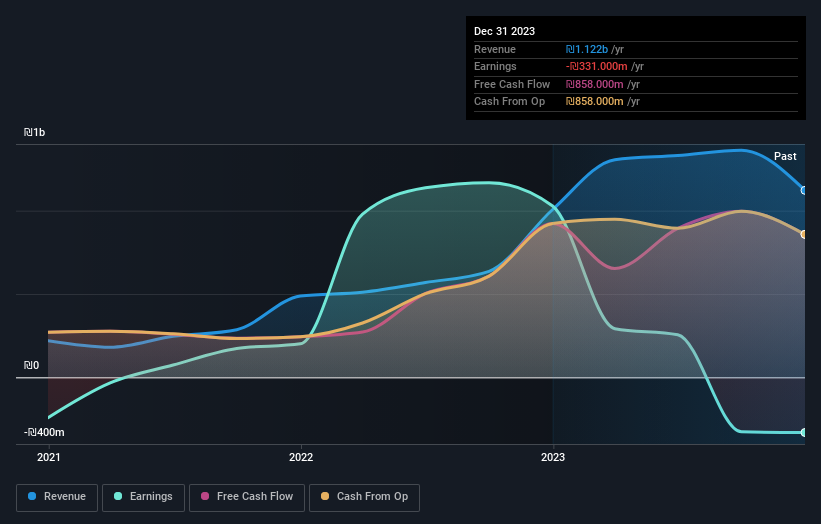- Israel
- /
- Real Estate
- /
- TASE:PTBL
Property & Building Corp. Ltd. (TLV:PTBL) surges 10%; public companies who own 67% shares profited along with institutions

Key Insights
- The considerable ownership by public companies in Property & Building indicates that they collectively have a greater say in management and business strategy
- 67% of the company is held by a single shareholder (Discount Investment Corporation Ltd.)
- Institutions own 19% of Property & Building
To get a sense of who is truly in control of Property & Building Corp. Ltd. (TLV:PTBL), it is important to understand the ownership structure of the business. And the group that holds the biggest piece of the pie are public companies with 67% ownership. In other words, the group stands to gain the most (or lose the most) from their investment into the company.
Following a 10% increase in the stock price last week, public companies profited the most, but institutions who own 19% stock also stood to gain from the increase.
Let's take a closer look to see what the different types of shareholders can tell us about Property & Building.
See our latest analysis for Property & Building

What Does The Institutional Ownership Tell Us About Property & Building?
Many institutions measure their performance against an index that approximates the local market. So they usually pay more attention to companies that are included in major indices.
We can see that Property & Building does have institutional investors; and they hold a good portion of the company's stock. This suggests some credibility amongst professional investors. But we can't rely on that fact alone since institutions make bad investments sometimes, just like everyone does. If multiple institutions change their view on a stock at the same time, you could see the share price drop fast. It's therefore worth looking at Property & Building's earnings history below. Of course, the future is what really matters.

Property & Building is not owned by hedge funds. Discount Investment Corporation Ltd. is currently the largest shareholder, with 67% of shares outstanding. This essentially means that they have extensive influence, if not outright control, over the future of the corporation. With 9.9% and 2.4% of the shares outstanding respectively, Clal Pension And Gemel Ltd and Yelin Lapidot Holdings Ltd. are the second and third largest shareholders.
While studying institutional ownership for a company can add value to your research, it is also a good practice to research analyst recommendations to get a deeper understand of a stock's expected performance. We're not picking up on any analyst coverage of the stock at the moment, so the company is unlikely to be widely held.
Insider Ownership Of Property & Building
While the precise definition of an insider can be subjective, almost everyone considers board members to be insiders. Management ultimately answers to the board. However, it is not uncommon for managers to be executive board members, especially if they are a founder or the CEO.
I generally consider insider ownership to be a good thing. However, on some occasions it makes it more difficult for other shareholders to hold the board accountable for decisions.
Our data cannot confirm that board members are holding shares personally. Not all jurisdictions have the same rules around disclosing insider ownership, and it is possible we have missed something, here. So you can click here learn more about the CEO.
General Public Ownership
The general public, who are usually individual investors, hold a 14% stake in Property & Building. While this size of ownership may not be enough to sway a policy decision in their favour, they can still make a collective impact on company policies.
Public Company Ownership
We can see that public companies hold 67% of the Property & Building shares on issue. This may be a strategic interest and the two companies may have related business interests. It could be that they have de-merged. This holding is probably worth investigating further.
Next Steps:
While it is well worth considering the different groups that own a company, there are other factors that are even more important. Consider for instance, the ever-present spectre of investment risk. We've identified 1 warning sign with Property & Building , and understanding them should be part of your investment process.
Of course this may not be the best stock to buy. So take a peek at this free free list of interesting companies.
NB: Figures in this article are calculated using data from the last twelve months, which refer to the 12-month period ending on the last date of the month the financial statement is dated. This may not be consistent with full year annual report figures.
New: Manage All Your Stock Portfolios in One Place
We've created the ultimate portfolio companion for stock investors, and it's free.
• Connect an unlimited number of Portfolios and see your total in one currency
• Be alerted to new Warning Signs or Risks via email or mobile
• Track the Fair Value of your stocks
Have feedback on this article? Concerned about the content? Get in touch with us directly. Alternatively, email editorial-team (at) simplywallst.com.
This article by Simply Wall St is general in nature. We provide commentary based on historical data and analyst forecasts only using an unbiased methodology and our articles are not intended to be financial advice. It does not constitute a recommendation to buy or sell any stock, and does not take account of your objectives, or your financial situation. We aim to bring you long-term focused analysis driven by fundamental data. Note that our analysis may not factor in the latest price-sensitive company announcements or qualitative material. Simply Wall St has no position in any stocks mentioned.
About TASE:PTBL
Property & Building
Operates as a real estate company in Israel and internationally.
Second-rate dividend payer low.


